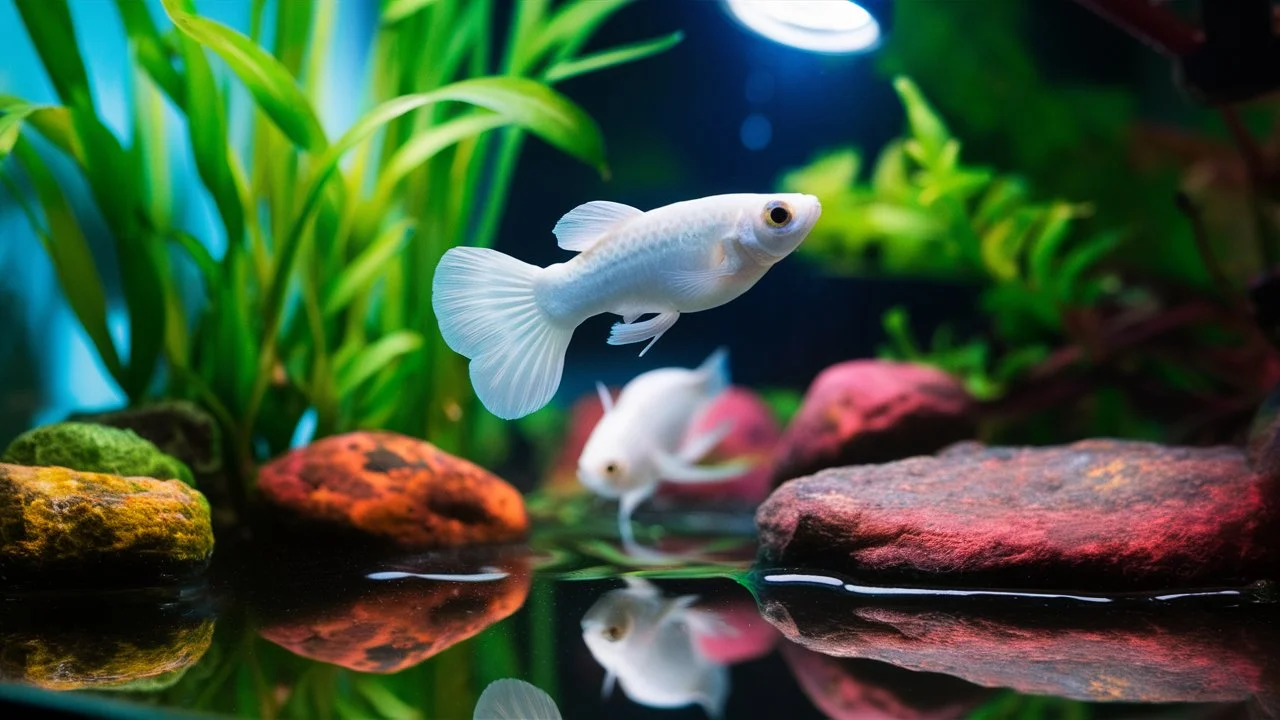The white Moscow guppy is a beautiful and popular type of fish that many people like to keep in their aquariums. Its bright white color makes it very attractive and eye-catching. These guppies are small and easy to take care of which makes them a great choice for both new and experienced fish owners.
The White Moscow guppy is a budget-friendly and delightful fish to have. They live for about three years and are easy to feed with common fish food. These guppies breed easily which means you can have lots of baby fish to enjoy. Keeping them healthy is simple just keep their water clean and their tank tidy.
Characteristics of the White Moscow Guppy
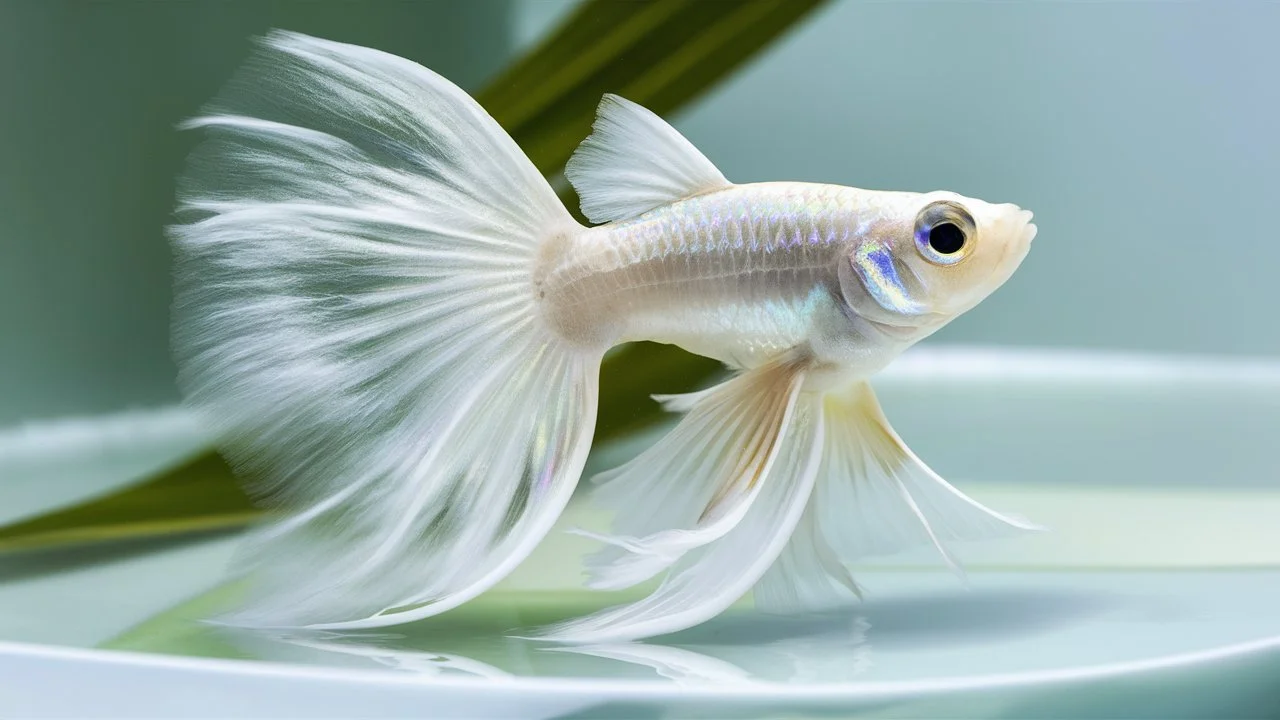
Striking Appearance
The White Moscow Guppy is known for its stunning and pure white color. This makes it a dazzling addition to any fish tank. The bright white color shines especially in well-lit aquariums and making these guppies a focal point.
Gentle Nature
White Moscow Guppies are peaceful and sociable, making them excellent tank mates for many other fish species. Their calm demeanor helps maintain a harmonious environment in the aquarium.
Size and Build
These guppies are relatively small typically reaching about 1.5 to 2 inches in length. They have a sleek body shape with fan-like tails that gracefully flutter as they swim.
Low Maintenance
Caring for White Moscow Guppies is straightforward which makes them a great choice for novice aquarium owners. They are adaptable to various water conditions and don’t require specialized diets or care routines.
Breeding Habits
Like other guppies, the White Moscow is easy to breed. They are livebearers, meaning the females give birth to swimming baby guppies rather than laying eggs. This can be an exciting process to observe and manage, potentially leading to a growing school of guppies over time.
Related reading:Black Moscow Guppy Cost: Lifespan, food, Breeding & Health
How Much Does a White Moscow Guppy Cost?
United States:
-
- Typically, a White Moscow Guppy costs between $5 to $10 each.
- Prices can be higher for specially bred or particularly vibrant specimens.
United Kingdom:
-
- Prices range from £3 to £8 per fish.
- Special offers may apply when purchasing multiple guppies.
Canada:
-
- Generally, each White Moscow Guppy costs about CAD $6 to $12.
- Discounts might be available for bulk purchases at some pet stores.
Australia:
-
- Expect to pay around AUD $7 to $15 for each guppy.
- Prices can vary based on the fish’s size and color intensity.
India:
-
- White Moscow Guppies are usually priced at INR 100 to 300.
- Lower prices are common in local markets compared to specialty stores.
These are general estimates and actual prices may vary depending on local availability and the quality of the fish.
How Long Does a White Moscow Guppy Fish Live?
A White Moscow Guppy typically lives for about 2 to 3 years. Their lifespan can vary depending on how well they are cared for.
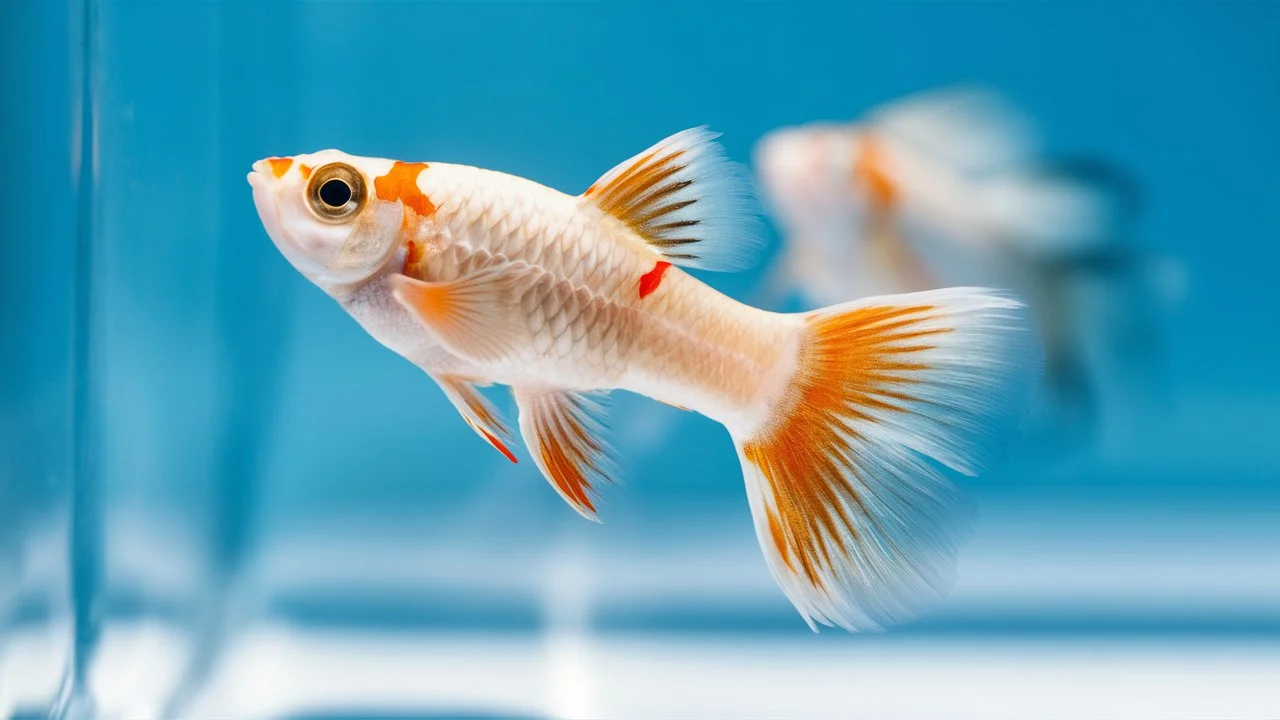
Factors Affecting Lifespan
Several factors can influence how long a White Moscow Guppy lives:
- Water Quality: Clean and well-maintained water is crucial for a healthy life.
- Diet: A balanced diet helps them stay healthy and can extend their life.
- Stress Levels: Less stress from factors like overcrowding can lead to a longer life.
Extending Their Lifespan
To help your White Moscow Guppies live longer, make sure they have clean water, a proper diet, and a comfortable environment. Regular tank maintenance and careful monitoring of their health can also play a big role in extending their lifespan.
What Do White Moscow Guppies Eat?
White Moscow Guppies are omnivorous and thrive on a varied diet. Their primary food can be high-quality tropical fish flakes, which provide essential nutrients. To keep your guppies healthy and vibrant supplement their diet with frozen foods such as bloodworms and brine shrimp which offer additional protein.
Live foods like micro worms or mosquito larvae also promote natural foraging behaviors and are excellent for their health. Occasionally, you can introduce small pieces of blanched vegetables like peas and cucumber to give them vital vitamins and minerals. This mix of foods ensures your White Moscow Guppies are both happy and healthy.
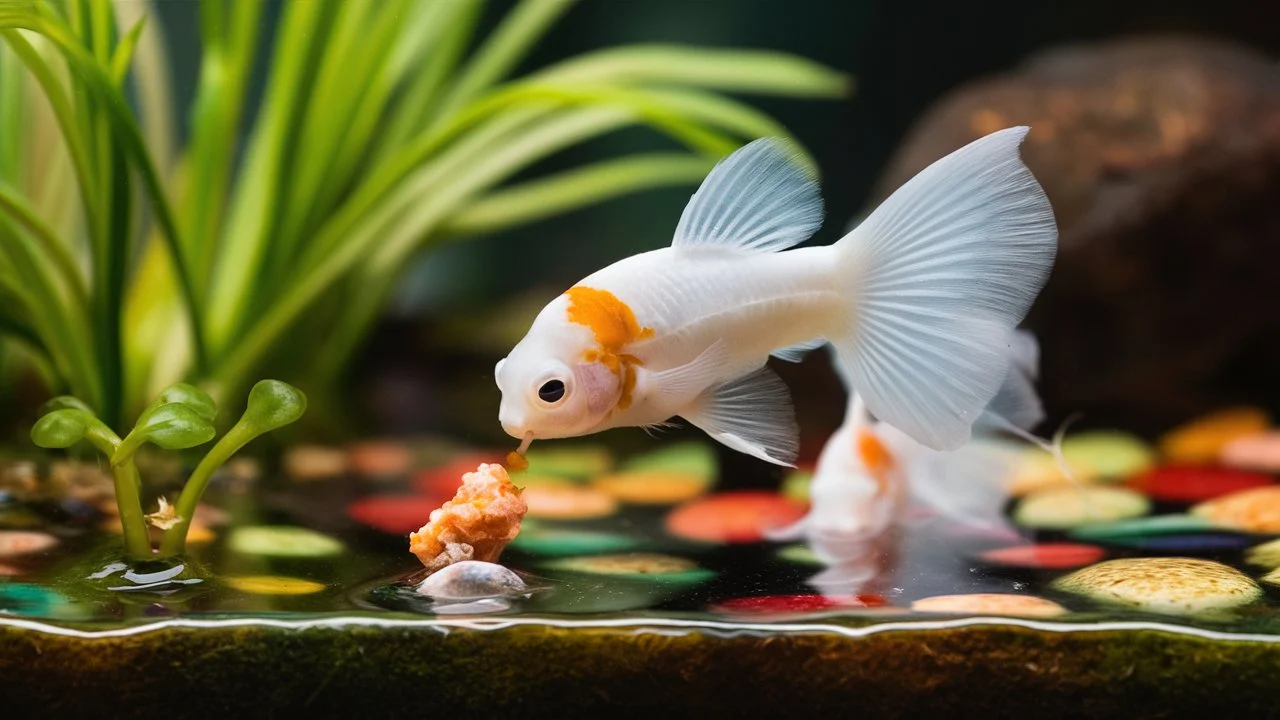
Choosing the Right Fish Food for White Moscow Guppies
When selecting food for your White Moscow Guppies, it’s important to ensure their diet supports their health and vitality. Here are some key points to consider when picking the right food for these beautiful fish:
Balanced Nutrition
- Commercial Flakes and Pellets: Choose high-quality flakes or pellets specifically formulated for guppies. These foods are balanced to provide all the essential nutrients.
- Supplementary Foods: Include variety in their diet with supplementary foods. This can help mimic their natural eating habits and provides additional nutrients.
Variety for Health
- Frozen Foods: Offer frozen foods like bloodworms and brine shrimp occasionally. These are good sources of protein.
- Live Foods: Live foods such as daphnia or mosquito larvae can be given to encourage natural foraging behavior and provide entertainment.
- Vegetables: Occasionally, introduce finely chopped or shredded vegetables like spinach or zucchini. These can add vitamins and fiber to their diet.
Feeding Practices
- Frequency and Amount: Feed small amounts several times a day instead of one large feeding. This reduces waste and mimics natural eating patterns.
- Observation: Watch your fish during feeding to ensure all are getting their share and to check for any uneaten food. Uneaten food should be removed to keep the tank clean.
Quality Matters
- Check Ingredients: Always look at the ingredients list. Foods with fish meal high on the list are generally of better quality.
- Avoid Fillers: Try to avoid foods with excessive fillers like wheat and corn, which offer less nutritional value.
Specific Needs
- Consider Life Stage: Ensure the food is appropriate for their life stage. Juvenile guppies may require more protein-rich foods to support their growth, while adults do well on a balanced diet with occasional treats.
Common Health Issues and Treatment of White Moscow Guppy
White Moscow Guppies like all aquarium fish can encounter several health issues. Recognizing these problems early and knowing how to treat them can help keep your guppies healthy.
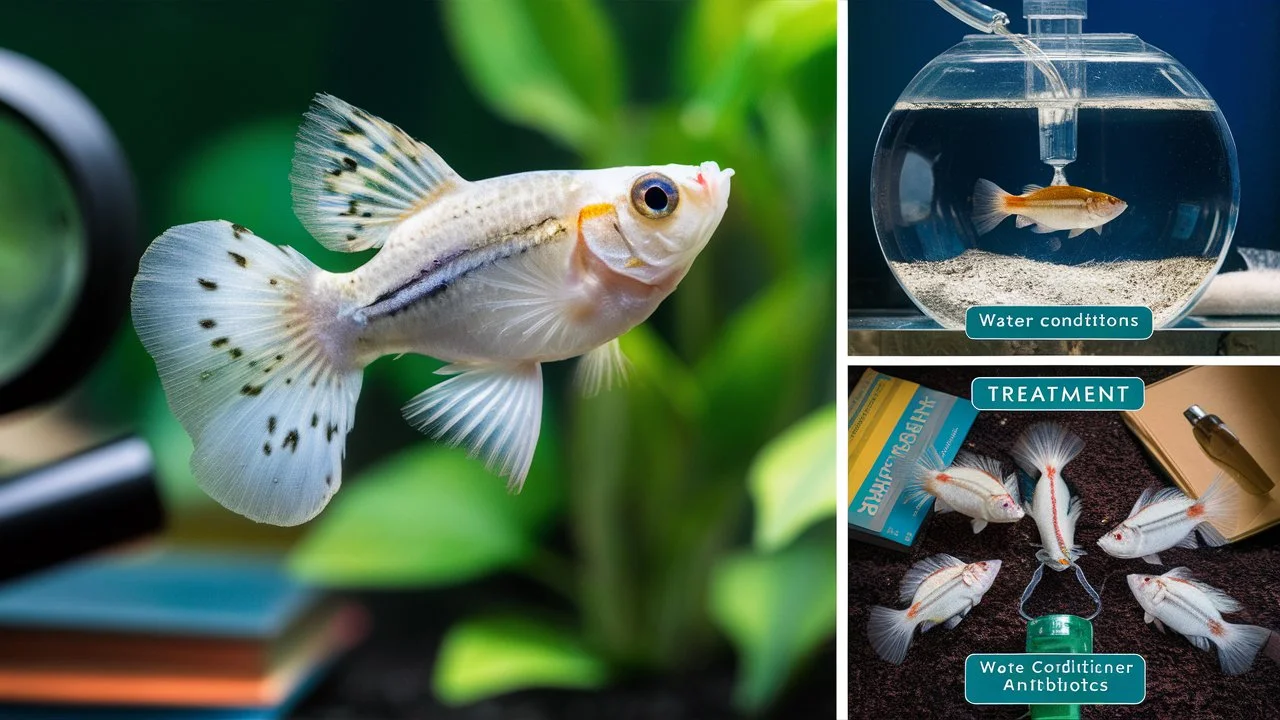
Here are some of the most common health issues and their treatments:
1. Fin Rot
- Symptoms: Frayed or disintegrating fins, often with a red or white edge.
- Treatment: Improve water quality and treat the water with an antibacterial medicine specifically for fin rot.
2. Ich (White Spot Disease)
- Symptoms: White spots on the skin and fins, guppies may rub against objects due to irritation.
- Treatment: Raise the aquarium water temperature a little to speed up the life cycle of the parasite and treat with a medication designed to eliminate ich.
3. Fungal Infections
- Symptoms: White or cottony growths on the skin, mouth, or fins.
- Treatment: Fungal infections can be treated with antifungal medications available at pet stores. Clean and maintain the tank regularly to prevent recurrence.
4. Swim Bladder Disease
- Symptoms: Struggling to swim, floating upside down or sinking to the bottom.
- Treatment: Often related to diet or water quality. Feeding peas (with skins removed) can help relieve constipation, which may alleviate the issue. Ensure clean water and consider fasting the fish for 24-48 hours.
5. Stress and Poor Water Conditions
- Symptoms: Lethargic behavior, not eating, or hiding more than usual.
- Treatment: Regularly test water parameters like ammonia, nitrites, and nitrates, ensuring they are within safe levels. Improve water conditions through frequent changes and good filtration.
Preventive Care:
- Regularly check water quality and maintain proper filtration to keep the environment clean and stable.
- Feed a balanced diet and avoid overfeeding to prevent water pollution and digestive issues.
- Quarantine new fish before introducing them to your main tank to avoid the spread of diseases.
Breeding Process of White Moscow Guppies
Breeding White Moscow Guppies is fairly simple and can be fun for both new and experienced fish keepers. Here’s a basic guide to help you get started:
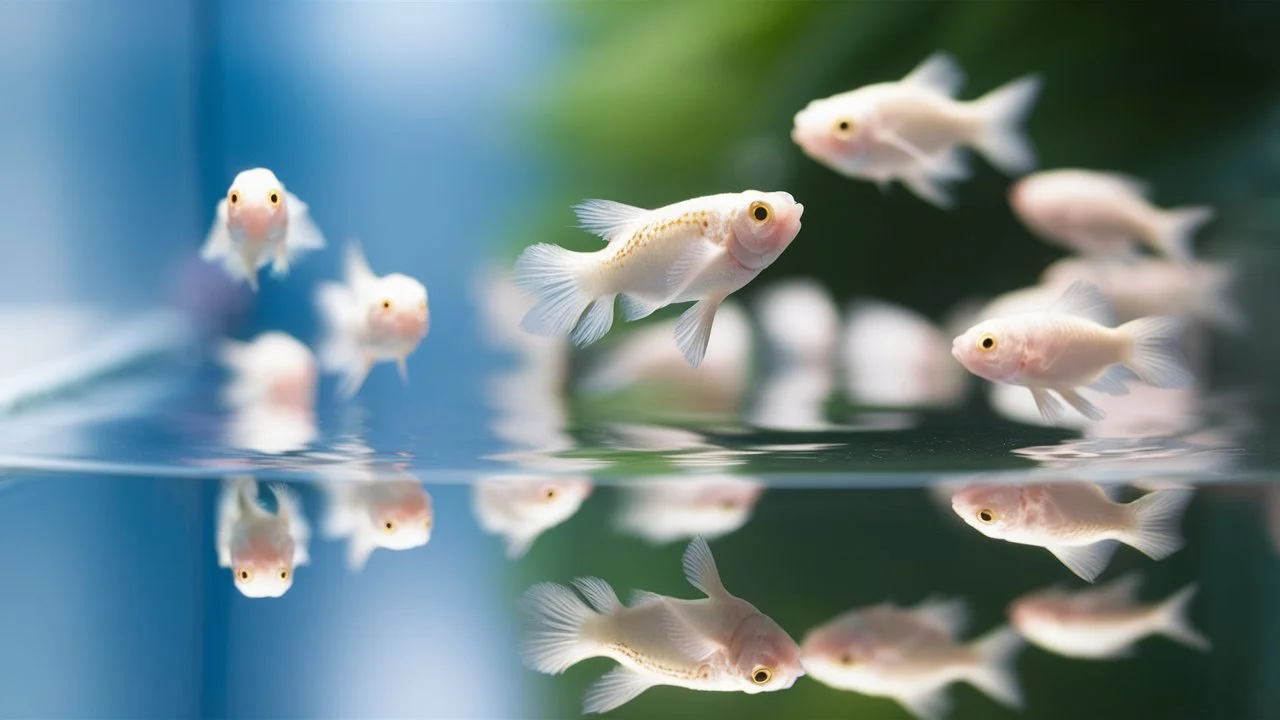
1. Set Up a Breeding Tank
- Use a separate tank for breeding, ideally 10-20 gallons.
- Keep the water clean and at a temperature of about 76-78 degrees Fahrenheit.
2. Choose Healthy Fish
- Pick healthy, mature males and females for breeding.
- It’s good to have more females than males to avoid stress.
3. Get Them Ready to Breed
- Feed them well with high-quality food and some live food like brine shrimp.
- Add plants or other hiding spots for the females to use.
4. Watch for Babies
- Guppies give birth to live babies, not eggs. The pregnancy lasts about a month.
- When the female looks bigger and has a dark spot near her back end, she’s ready to give birth.
5. Care for the Fry
- Move the babies to a separate area right after they’re born so they aren’t eaten.
- Feed the babies special small food that they can eat easily.
- Keep their water very clean.
6. Growing Up
- The baby fish will start showing colors after a few weeks.
- They grow up fast and can be treated like adults after a few months
Conclusion
White Moscow Guppies are an affordable and delightful addition to any aquarium. They typically cost between $5 to $15, live for about 2 to 3 years, and thrive on a simple diet of flakes, frozen, and live foods. Breeding them can be a rewarding experience if you maintain a proper environment and care routine. However, be aware of common health issues like fin rot and ich, which require prompt treatment to keep the fish healthy. Overall, with good care, these guppies can bring beauty and joy to your tank.
